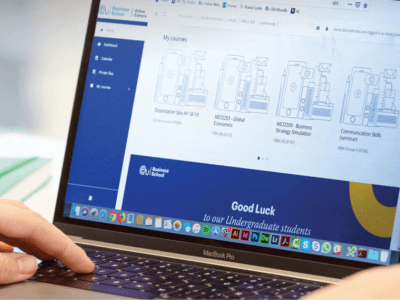In the modern workplace, those who wish to climb the career ladder quickly are expected to go beyond the limits of their job description. Although old cliches about “who you know” still hold some relevance, this concept has evolved from a shorthand for nepotism to the need to develop professional influence.
Professional influence is currently seen as one of the most crucial differences between those who stagnate in the same position and those who are able to access new opportunities. As a result, there is now an audience of ambitious people eager to understand just what professional influence is and, most importantly, how they can build it for themselves.
What is Professional Influence?
Someone with a wealth of professional influence is likely to be considered a “go-to” person on a specific topic. When projects are being designed and decisions are being made, their input and insight is considered invaluable. Of course, this implies a high level of trust from both their superiors and their colleagues. In fact, someone with a lot of professional influence may even be seen as a mentor for others in the workplace and an example to aspire to.
If their influence extends further, they could be recognized as a thought leader in their field. They’re likely to be in-demand as a consultant or a panel speaker. When they launch projects of their own, they have a network of professionals who can be depended upon to support their ventures.
This is what it looks like to have professional influence, and of course it’s a very desirable and powerful position to occupy. That’s why so many people in the business world are now focusing their attention on developing professional influence as part of their long-term career planning.
How Do You Gain Professional Influence?
There has been a wealth of advice published regarding strategies to build professional influence. Although perspectives differ, there are some common themes to be found amongst the guidance available:
- Be empathetic. For others to value your opinion, they must feel that you also value theirs. It’s important to familiarize yourself with the perspectives of those you work with so you can explain the benefits for them in collaborating with you. It’s natural for people to think “what’s in it for me?” when you ask them for support. In order to have an inspiring answer, you must commit time to actively listen and so understand their hopes and fears.
- Build connections. Networking is fundamental to developing professional influence, and to do it successfully requires a proactive approach. That means reaching out personally to powerful players, attending industry events, and participating in development opportunities where you can connect with people in your field. It could represent an additional workload; however, if you’re truly committed to developing your sphere of influence, it’s essential.
- Have an inspiring vision. You’re unlikely to rally people around the cause of your own personal ambition. Instead, look for ways to build a shared mission that will motivate others into action. Look for areas of opportunity where you can provide clarity for your colleagues and make their work more meaningful. Most of all, make sure that you have powerful pitches when it comes to your projects.
- Share what you do. You may be doing innovative, important work, but that won’t help to build your influence unless it’s being noticed. Find channels to share your progress and your ideas with others. Speak up in meetings and don’t undervalue your own unique perspective. An idea that may seem obvious to you could be a revelation to others. This is how you develop a reputation as a confident, dynamic operator in the workplace.
- Develop a specific expertise. If you notice a lack in your office, one way to ensure your ongoing importance and influence is to fill it yourself. This may involve undertaking research and investing in building new skills. It pays to keep abreast of developments in your industry so that you can take responsibility for pioneering them in your workplace. Your professional influence increases alongside the value of your contributions.
What Are the Pitfalls To Avoid While Building Professional Influence?
Professional influence is ultimately an interpersonal matter, so there is scope for problems to arise as with any other relationship. To avoid unnecessary conflict or resistance, it has been advised to avoid the following:
- Egotistical language. If you are constantly talking about “I” and never about “we,” the people supporting you will feel undervalued. When resentment develops, future support then falls into jeopardy. It’s important to appropriately acknowledge the contributions of your collaborators as you share your success stories.
- Aggressive or negative behaviors. When we are passionate about our ideas, there is a risk that our promotion style will veer into the aggressive. Assertive behavior inspires trust; however, aggressive behavior only increases hostility. Similarly, you should ensure your tone remains as positive as possible when you try to influence others, so they’re motivated to contribute.
- Insincerity. It’s easy to sense when someone’s interest in us is insincere. When building relationships, ensure you are giving people your full attention. Don’t make false promises or claim to agree with their ideas when you don’t. Strong relationships are based on honesty, even if that means overcoming personal differences.
- Neglecting opportunities. Despite the challenges represented by current circumstances, you can still make connections and raise your profile. Virtual meetings remain an option and there are many internet platforms on which you can position yourself as a thought leader. Web events still require knowledgeable speakers and panel members to contribute.
How Can Professional Influence Help to Unlock Career Opportunities?
Building professional influence takes time, effort and attention; however, the benefits are obvious. With greater professional influence, people are empowered to advance their personal projects.
As informal leaders, they have a higher profile and a stronger reputation in the workplace. This means they are more likely to be promoted or receive a raise. They are also on the radar of industry leaders more generally, which means they are among the first considered when it comes to new opportunities.
Professional influence continues to emerge as an important determiner of success in the modern business landscape. Whatever your career goals may be, there are clear advantages to developing your professional influence.










